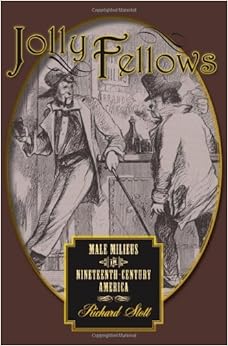This is another one of several books from the pile I picked up when a co-worker was moving, and I had to rely pretty much just on the title. I am, after all, rather interested in nineteenth century history in general so I figured this book would be a useful expansion of my existing knowledge. Jolly Fellows is a largely historiographic text which talks about the titular jolly fellows, a culture of hard-drinking, hard-gambling, hard-fighting men that were extremely commonplace at the beginning of the nineteenth century but were nearly extinct towards the end, existing in a few enclaves. Stott touches upon the reasons for their disappearance but this text mostly talks about the behavior of the jolly fellows and their survival in some respects to the modern day. I did get a feeling that Stott was, in some respects, trying to defend the jolly fellows as a natural outpouring of male enthusiasm, a sort of "boys will be boys" argument, but even Stott seems unconvinced. Overall based on his description I can't say many people would mourn the loss of the jolly fellows.
This book chronicles a male institution that Stott asserts was commonplace into the early years of the nineteenth century. Every city, town, or village would have a group of "jolly fellows", a band of men who spent most of their leisure time drinking, gambling, fighting, carousing, and playing practical jokes, much to the amusement of the other people. Some jokes were fairly tame, such as putting buckets of water on top of doors or in one instance disassembling an entire wagon and placing it on top of someone's barn, but violence also seems to be central to jolly fellowship. Brawls between fellows were common, as well as brawls between fellows and outsiders, which resulted in death on occasion. In addition, blood sports such as dogfighting and cockfighting, bullbaiting, bearbaiting, and badgerbaiting, and in some cases just setting an animal on fire with turpentine were all pastimes of the jolly fellows. In a way they seem to perfectly match Hobbes's description of human life: nasty, short, and brutish.
Stott's chronicle begins towards the end of the eighteenth century with a general description, including the oh so pleasant activities that I described above and states that for centuries this had been seen as normal behavior for men. Again, sort of a "boys will be boys" argument. However people, especially women, became increasingly concerned about jolly fellows' behavior and the early nineteenth century saw the beginning of reform movements, perhaps most importantly temperance, which sought to clamp down on such behavior. Stott doesn't point to one particular cause for the decline, but seems to point to a combination of temperance, religious revivalism, and in frontier areas where women were scarce a simple increase in the number of women which led to a reduction in such behavior. Jolly behavior gets pushed into remaining bastions, such as all-male environments on the frontier like lumber, cattle, and mining camps, and the rough and tumble vice districts of cities such as New York.
Much of the book is dedicated to the permutations of jolly fellowship in various locations, such as small towns and villages, the New York Bowery, and the gold fields of California. Stott emphasizes the consistent nature of jolly fellowship through these disparate locations and the perpetual emphasis on drinking, gambling, and violence. For the most part I have to agree with him that there seems to be a trend where unsupervised men in their late teenage years and twenties seem to get themselves into all sorts of trouble. The sheer prevalence of those three key behaviors in practically any male-dominated environment for at least the first half of the nineteenth century shows that this seems to have deeper cultural connections. (Although personally I feel like Stott doesn't go too deeply into the details and it probably would be mere conjecture at this point anyway.) There are even numerous examples of men who made a career out of being jolly fellows, and there is an abundance of jolly fellow songs, plays, and literature which reached a far wider audience than those who indulged in jolly behavior on a regular basis.
However, the latter half of the nineteenth century saw a triumph of "middle class" values, including increased temperance and anti-gambling legislation, and less and less people participated in jolly behavior. Granted, comedic violence was (and still is) utilized in theater, music, and other forms of entertainment, but pranking became much more mild and jolly behavior became almost nonexistent. Stott actually ends the book by providing examples of people saying that the civilizing of men perhaps has gone too far and to make sure men still have vim and vigour they need to be encouraged to go into properly moderated violence, like boxing and football. Stott does provide some examples of how jolly fellowship has survived, albeit in a much tamer form today, but I feel like we're largely better off without such behavior.
-Kalpar


No comments:
Post a Comment